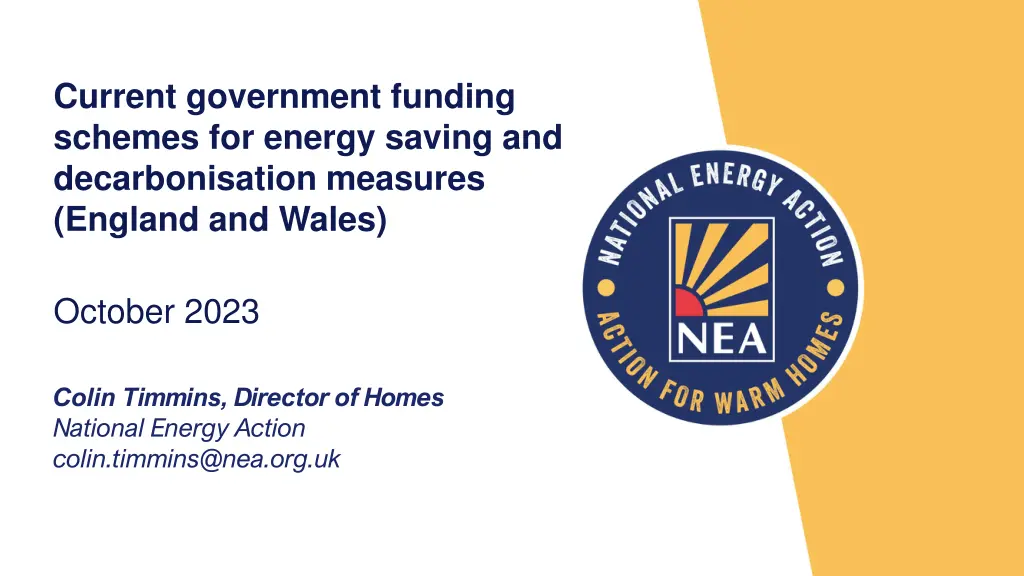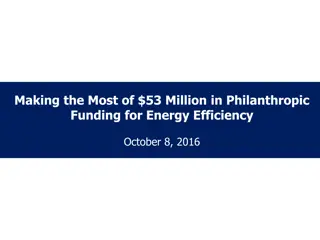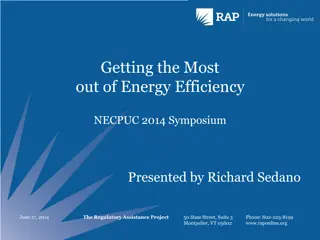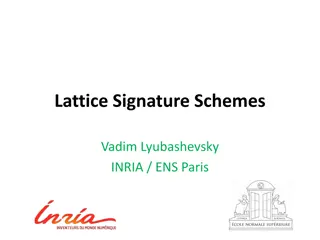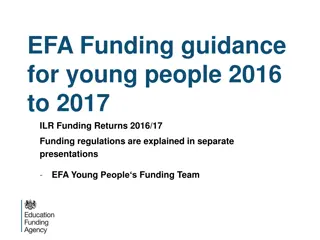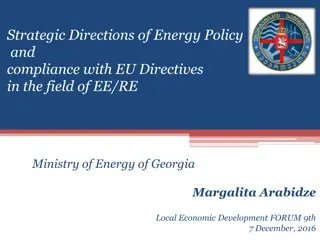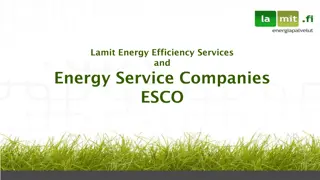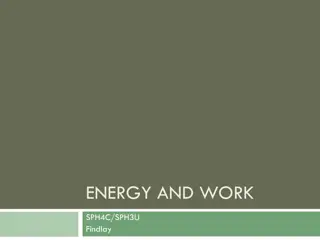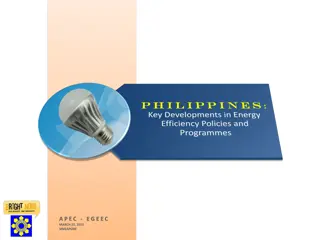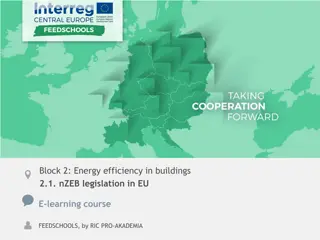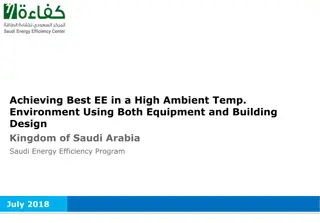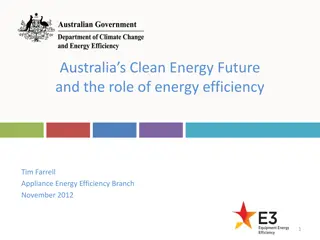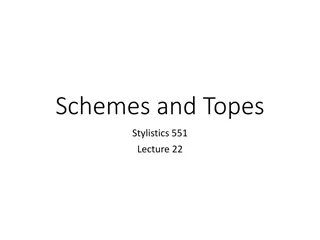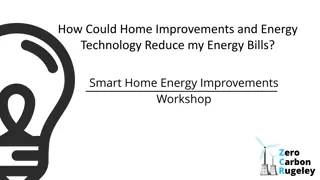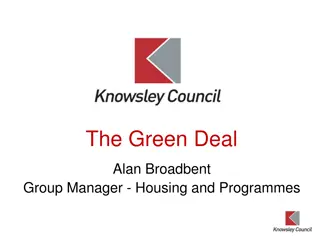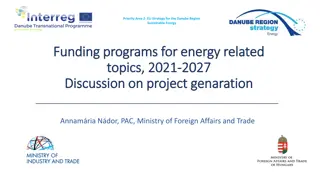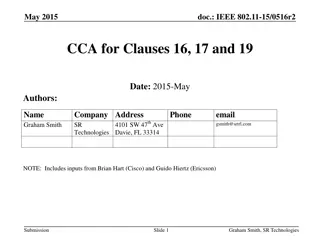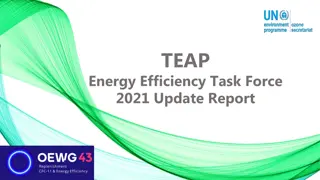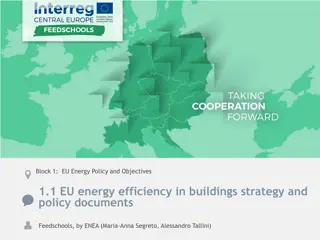Government Funding Schemes for Energy Efficiency
Overview of current UK government schemes like ECO, GBI, and more for energy-saving measures and decarbonization in homes. Includes figures, targets, and programs available in England and Wales. Details on EPCs and installation standards are also provided.
Download Presentation

Please find below an Image/Link to download the presentation.
The content on the website is provided AS IS for your information and personal use only. It may not be sold, licensed, or shared on other websites without obtaining consent from the author. Download presentation by click this link. If you encounter any issues during the download, it is possible that the publisher has removed the file from their server.
E N D
Presentation Transcript
Current government funding schemes for energy saving and decarbonisation measures (England and Wales) October 2023 Colin Timmins, Director of Homes National Energy Action colin.timmins@nea.org.uk
Summary of current government schemes Energy Company Obligation (ECO) Great British Insultation Scheme 2022- 2026 2023- 2026 Since 2011 2023 - 2025 CLOSED 4 billion England, Scotland, Wales 1 billion England, Scotland, Wales Nest 25 million in 2021-2022 Wales Home Upgrade Grants (HUG 2) 630 million England Local Authority Delivery Scheme (LAD 3) Social Housing Decarbonisation Fund (Wave 2.1 and 2.2) Optimised Retrofit Programme (ORP 3) Boiler Upgrade Scheme 287 million England 2022 - 2025 2022 - 2025 2022 - 2024 2022 - 2027 858 million England c 120 million since 2019 450 million Wales England and Wales Zero Rated VAT N/A England, Scotland, Wales, NI
Background - Energy Performance Certificates (EPCs) EPCs Generated by the SAP energy performance calculation tool (usually the reduced data set version). Produces an A-G rating for the house with suggested opportunities for improvement. Most funding schemes focus on improving the EPC rating up to a maximum of band C (the target for fuel poor households.) Details on the GOV.UK website. SOURCE: Ofgem ECO guidance
Background Installation standards Compliance Government funded energy efficiency schemes have required compliance with PAS 2035 and PAS 2030, as well as Trustmark registration since 2021. PAS 2035 provides a specification for the energy retrofit of dwellings, including assessment, evaluation of options, design and monitoring. PAS 2030 specifies requirements for the installation of energy efficiency measures in existing dwellings, including process and methods. Trustmark is the Government endorsed quality scheme for work carried out in homes.
Energy Company Obligation (ECO4) What is it? A legal obligation on energy suppliers to deliver energy efficiency measures to domestic premises. Supplier targets are based on their market share (total target 224.3m in annual bill savings). Targets low-income and vulnerable and fuel poor consumer groups in EPC bands D-G. Covers owner occupiers, private rented sector and social housing (with some limitations for landlord owned properties.)
Energy Company Obligation (ECO4) Main obligation the Home Heating Cost Reduction Obligation (HHCRO) A fabric first multiple measure whole-house retrofit policy : EPC band D and E homes must be improved to at least a band C. Band F and G homes must be improved to at least a band D. Must follow the domestic retrofit process as set out in PAS2035:2019. Two sub-obligations Solid wall insulation - 90,000 equivalent. EFG minimum -150,000 owner occupied or PRS homes in EPC band E, F or G.
Energy Company Obligation (ECO4) - Eligible measures Measures list and eligibility guidance is on the Ofgem website.
Energy Company Obligation (ECO4) Eligibility 1 A member of the Help to Heat group (HTHG). Eligibility requirements do not apply to in- fill premises, e.g. one house on the same street as three ECO- eligible houses. SOURCE: Ofgem ECO guidance
Energy Company Obligation (ECO4) Eligibility 2 ECO4 Flex Local authorities and the Scottish and Welsh governments can refer householders to an energy supplier (must publish a Statement of Intent). This can cover low income and/or vulnerable householders not in receipt of the listed means tested benefits, based on one of the following: Combined income under 31,000. Meeting two proxies, e.g. free school meals, referred for support. NHS referrals for health conditions that could be impacted by cold homes. Bespoke targeting where suppliers and LAS propose a new method to identify low income and vulnerable households. Energy suppliers can also use this route, e.g. where there is regular self-disconnection. Up to 50% of a supplier s obligation can be delivered through this route.
Energy Company Obligation (ECO4) How to apply Directly through some energy supplier websites (list and links at Which.co.uk.) Some may require applicants to be a customer. Ofgem publishes a list of ECO contacts for energy suppliers. Through Local Authorities offering ECO Flex routes who've published a Statement of Intent. Things to be aware of Installers must be TrustMark-accredited and will have a registration number. Credentials can be checked on the TrustMark website. Householders may have to contribute towards the installation cost. Permission is required from landlords if the applicant is a tenant.
The Great British Insulation Scheme What is it? An extension of the Energy Company Obligation (consulted on as ECO+) Targets the least energy-efficient homes in Great Britain to tackle fuel poverty and help reduce energy bills. Will mostly deliver single insulation measures. Eligibility: EPC rating of D-G, and Within Council Tax bands A-D in England and A-E in Scotland and Wales. 20% of delivery must be to low-income households. Tenure also determines measure eligibility.
The Great British Insulation Scheme Insulation general Loft insulation Heating controls Eligibility SAP band CWI Owner occupier Private rented Owner occupier Private rented Social housing Social housing D G General D G Eng & Wales D E Scotland D G Low income D G Eng & Wales D E Scotland D Innovation measures only Social housing E - G - Variations apply for flex routes and in-fill properties. - Insulation general covers SWI, roof, floor, park home, and innovation measures.
The Great British Insulation Scheme SOURCE: Ofgem guidance
The Great British Insulation Scheme How to apply The Great British Insulation Scheme (GBIS) eligibility checker on the GOV.UK website and helpline 0800 098 7950. Directly through some energy supplier websites (list and links at Which.co.uk.) Some may require applicants to be a customer. Ofgem list of ECO and GBIS contacts for energy suppliers. Through Local Authorities offering ECO and GBIS Flex routes who've published a Statement of Intent. Things to be aware of Installers must be TrustMark-accredited and will have a registration number. Credentials can be checked on the TrustMark website. Householders may have to contribute towards the installation cost. Permission is required from landlords if the applicant is a tenant.
Nest What is it? Nest delivers energy efficiency improvements for eligible households funded by the Welsh Government s Warm Homes programme Eligibility: Owner occupier or private rented sector A household member on means tested benefit and EPC rating is E G OR Household member has a chronic health condition, household is on a low income and property is EPC band D - G. Measures include new boilers, insulation and solar panels. All households can receive free and impartial advice. Access is through the Nest website or by freephone 0808 808 2244.
Home Upgrade Grant (HUG2) Approach Local Authorities bid for grant funding to carry out energy efficiency upgrades and install low carbon heating on homes with no gas connection for heating. 60% of HUG 2 funding ringfenced for rural LAs. Eligible households Combined gross annual household income 31,000. OR Located in an eligible area (Indices of Multiple Deprivation income deciles 1 3). PLUS Off-gas grid and EPC rating below C.
Home Upgrade Grant (HUG2) Funding process for local authorities Outline application for in principle funding on (Nov 22 & Jan 23). Funding drawn down through batch applications. Households signed up with homes validated and assessed in line with PAS 2035. Funding approved and drawn down in batches. SOURCE: Home Upgrade Grant: Phase 2 guidance for local authorities.
Home Upgrade Grant (HUG2) Eligible measures Any measure compatible with RdSAP except fossil fuel heating (including hybrids). EPC band F - G homes should be upgraded to at least D. EPC band D - E homes should be upgraded to C. Consideration should be given to improving properties to a space heating demand target of 90 kWh/m /year or lower where reasonable and cost efficient. It should be made clear to all technically suitable homes that a heat pump is an available measure.
Home Upgrade Grant (HUG2) Grade A Grade C Grade B
Home Upgrade Grant (HUG2) Applications A list of successful local authorities can be found on the GOV.UK website. The application process and requirements for each local authority will need to be checked. Considerations Homes must not be connected to mains gas for heating purposes. Low-income owner occupiers should not be required to contribute towards the cost of upgrades. Private rented sector dwellings restricted to landlords with 4 or less properties.
Local Authority Delivery (LAD3) What was it? Scope to support low-income households heated by mains gas. Local authorities or Local Energy Hubs could bid for funding to improve homes to EPC band C (or D if not possible), targeting: Homes with annual gross income less than 30,000. Existing properties with an EPC of D G (D capped at 30%). Full grant funding to owner occupiers. Private landlords had to contribute 30% of costs. All delivery had to be completed by March 2023.
Social Housing Decarbonisation Fund (SHDF) Wave 2.1 What is it? Funding to improve existing social housing stock currently below EPC band C Up to 10% infill with homes above EPC C Up to 30% infill from non-social homes). Funding can be applied for by: Local authorities Combined authorities Registered providers of social housing Registered charities that own social housing. At least 50% of total eligible costs must be provided by the applicant.
Social Housing Decarbonisation Fund (SHDF) Wave 2.1 Criteria Homes on or off the gas grid, including a minimum of 100 social homes at band D G. Properties must reach EPC band C (or D for E/F properties.) Bids must include details of tenant engagement. Details of successful bids can be found on the GOV.UK website. Wave 2.2 will open for applications in November 2023.
Optimised Retrofit Programme (ORP 3) What is it? Registered Social Landlords and local authorities apply for funding to retrofit their own stock. Allocation of funding based on stock numbers. Focus is on optimising the thermal and energy efficiency of Welsh social homes. Supports approaches to the decarbonisation of homes which enables the wider necessary infrastructure to be addressed ensuring issues such as skills development, procurement, finance models, material selections and the foundational economy are all considered and developed. Social landlords are required to install Environmental Sensors. Grants scheduled to be awarded by 9 October 2023.
Boiler Upgrade Scheme Grants for low carbon heating 5,000 for ASHPs or biomass boilers. 6,000 for GSHPs. Due to increase to a flat grant of 7,500 from 23October 2023. Eligibility Must be fully replacing an existing fossil fuel system. Property must have a valid EPC with no outstanding recommendations for loft or cavity wall insulation. Social housing is not eligible. Applicants must pay the additional costs but receive separate funding for insulation. Applications are done through installers, who must be certified by the Microgeneration Certification System (MCS.)
Zero rated VAT on energy saving products Reduced rate of VAT on energy saving materials of 5% covered by the Finance Act 2001. Energy saving materials covered Heating and hot water controls Draught stripping New rules introduce a temporary zero rate on the supply and installation of such materials in residential accommodation. Insulation Solar panels Applies from April 2022 (May 2023 in NI) to March 2027. Ground source heat pumps Air source heat pumps New rules temporarily remove the social conditions and other tests required for the lower rate. Micro CHP Wood-fuelled boilers HMRC provide guidance for contractors and sub-contractors. Water and wind turbines
Thank you for listening Go to www.nea.org.uk colin.timmins@nea.org.uk National Energy Action is an independent charity Registration No. 290511
